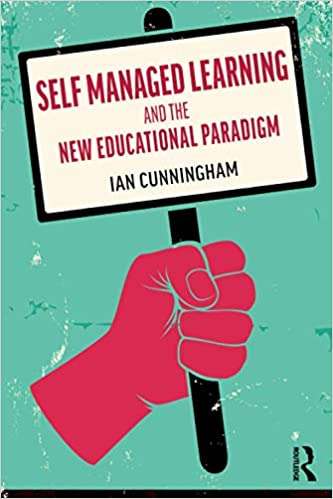Education Provider Voice 1
Dr Ian Cunningham – Founder and Chair of Governors, Self-Managed Learning College

Dr Ian Cunningham is the founder and Chair of Governors at Self Managed Learning College (SMLC) in Sussex, and author of Self Managed Learning and the New Educational Paradigm.
SMLC is part of the educational charity, Centre for Self Managed Learning and they have been providing educational programmes for young people aged 9-17 for 18 years.
The College is a self-directed, democratic, freedom-orientated learning community.
[You can watch a film on our page about democratic/self-directed education which illustrates how the SMLC approach can lead to positive outcomes for young people.]
What are the main principals of SML College’s approach to education?
Conventional schools are about teaching children subjects in classrooms against an imposed curriculum. We are different because we assist young people to learn whatever they wish, however they wish to learn, wherever they want to learn, why they want to learn.
Students can literally learn anything that they want. We encourage students to be challenging and creative in what they want to do with their lives.
Why are you interested in progressive education?
Because research evidence shows that this is the only way to honour the fact that all young people are different, like to learn in different ways and want to learn what will help them to lead a good life.
Look at the research evidence on the dangers of schooling. For example, young people who are bullied are more likely to commit suicide and have mental health problems in adulthood. Mental health problems for young people go down in the holidays and increase in term-time. Summer-born children perform less well in GCSEs and are less likely to go to university etc.
[You can read some of Ian Cunningham’s research in these areas in the Articles section of this website]:
What is a 21st Century Education?
In your opinion what are the main challenges of our current school system?
It is falling apart. Stress, discrimination against young people who are different, irrelevant teaching, lack of real care for individuals, etc, etc.
If you could make changes to the state education system, what would be your top priorities?
Abolish current schools. Create local small-scale learning centres that meet the needs of all young people. We have proved that it can work, and it’s more cost effective. Our College costs over 20% less than conventional schools to run and has a greater level of success in preparing young people for the world as it is.
How do you define success? Can you give examples of how your students are better prepared for the world?
Here are direct quotes from ex-SMLC students from independent research during 2018-9:
“I feel as if the SMLC developed my social skills greatly – perhaps due to the mixed age groups and alternative nature of the people who attended. I didn’t do too much academic study, but I don’t think I suffered in the long-term from that at all.”
“Friendships, Social skills, the importance of motivating yourself.”
“I think it really helped me to increase my confidence and connect back into society after having been very isolated. I think socializing was the biggest and most positive thing I got out of my experience.”
The research also showed how much ex-students valued having a real level of freedom and what they gained from that:
“Allowed me to make decisions about what was best for me and I don’t regret a single thing.”
“By allowing & thriving for independence. If I had not attended SMLC, if I had not been given the opportunity to try and test new things, especially the invaluable work experience with my dad, I would be very, very lost.”
“Easing my way into education and social environments has helped me learn and change on my own terms, and be myself more comfortably. Being an accepted part of a community helped me grow immensely.”
“It allowed me to focus on what I wanted do with my life and provided support for that.”
“I think it gave me some time as a teenager to figure out what it is that I actually enjoy doing. I may have forgotten that for a while but have gotten back to it of late. I don’t know I’d be as sure of what it is I want without having attended. Not to mention I’m still close with one or two people from there.”
“I made new friends; I got to learn what I want to learn.”
Self-confidence was mentioned often as an outcome of the way the community works:
“Built my confidence by being respectful, no shouting or any fear-based learning. Before SMLC I was sick to my stomach, sick at school, always sad and in the toilet. After leaving SMLC I was full of confidence and caught up with all the school work that I had missed which was about a year out of school. I had the confidence to go to any school and not let authoritarian teachers get me down as much as they used to.”
“It helped me to be confident in being myself and knowing that I was free to be interested in and love whatever I want. I would say it helped me in managing my own learning and reaching my goals. SMLC definitely did a lot for my confidence. “
This latter quote in its mention of learning to manage one’s own learning – and life – is supported by other comments:
“I have made many different friends during my time at SMLC. I have also learnt how to better my time and organise myself. This has come in very useful when trying to juggle college, work and social life.”
“It definitely helped me with art. I think it also made me more independent.”
The last area I want to mention here is on the emotional learning that goes on. Students feeling valued and supported. And developing emotional maturity:
“It made me feel like an actual individual rather than just another name on a sheet. I have so many good memories from SMLC.”
“Well I probably would have killed myself [without SMLC]. I wasn’t enjoying being home-schooled, I had no friends, it also helped me achieve the necessary qualifications to move on to college.”
“I find myself to be much more emotionally mature than my peers. I know myself – who I am, what I need, what I want – much better than anyone else I know. I know, appreciate and respect the value of education because it has not forced upon me in a careless and rigid way.
I have experienced freedom in my life and my education, which I don’t think many people do, or at least feel they do, and this has reinforced my belief that ‘doing life’ in your own way and outside of the norm, in a way that benefits and suits you, isn’t naive or stupid.
I can say that everything I’ve done has been my own choice. And knowing that I have this freedom continues to inform my decisions and thus makes me very happy. I can’t blame anyone else for these choices and I can’t be ‘sour’ because things haven’t worked out for me.
Further, in terms of higher education – having studied for my GCSEs more or less of my accord and in my own way – I found the work at College to be relatively easy in terms of reading etc, and especially in terms of University. I have the motivation to read etc, and then apply and evaluate that.”
“I made four good friends, two of which I am still very close with now. The staff were very supportive but not pushy. I felt comfortable and secure there. I felt valued and important. I was able to get GCSEs to progress to college.”
The learning and development that ex-students cite has not come from ‘working’ in the way that many parents and teachers would demand. The learning looks almost accidental and yet it is the core of what is important.
Young people are developing their identity in this period of their lives and they are learning to develop what has become labelled ‘emotional intelligence’. This emotional maturity has been shown to be more important than IQ or academic qualifications in adults’ satisfaction with life and success in their careers (see for example, Clarke et al, 2018).
Find Out More About Self Managed Learning
Latest Book:
Dr Ian Cunningham has published seven books and over 120 articles and papers on topics relating to education, learning, leadership and organisational change.

His latest book proposes revolutionary change to the educational system. Self Managed Learning and the New Educational Paradigm establishes the case that learning, as a core human activity, is too important to be left to schools and other educational institutions. The book goes beyond just a critique of current practice in showing how the new educational paradigm at SMLC works.
Cunningham also draws on his extensive work using Self Managed Learning in many of the world’s largest organisations to show how this new paradigm can be put into practice.
The book blends the unequivocal research evidence that we need a New Educational Paradigm with a real live demonstration of what it could look like.
Articles/Research:
The Student Experience of Self Managed Learning (SML): Evidence From Research
‘This is the Best Thing in School’: Self Managed Learning at Uckfield Community Technology College
Podcast:
Ian took part in the Rethinking Education podcast series which you can listen to here:
Ian Cunningham on Self Managed Learning
Ian Cunningham on Why Schools Shouldn’t Exist
School Support:
Find out how Ian Cunningham works to support mainstream schools.
Follow Self Managed Learning College:
Twitter @smlcbrighton
Facebook @smlcbrighton
YouTube https://www.youtube.com/channel/UCJOPw1u5lFBR2haYr4cXJ2A

